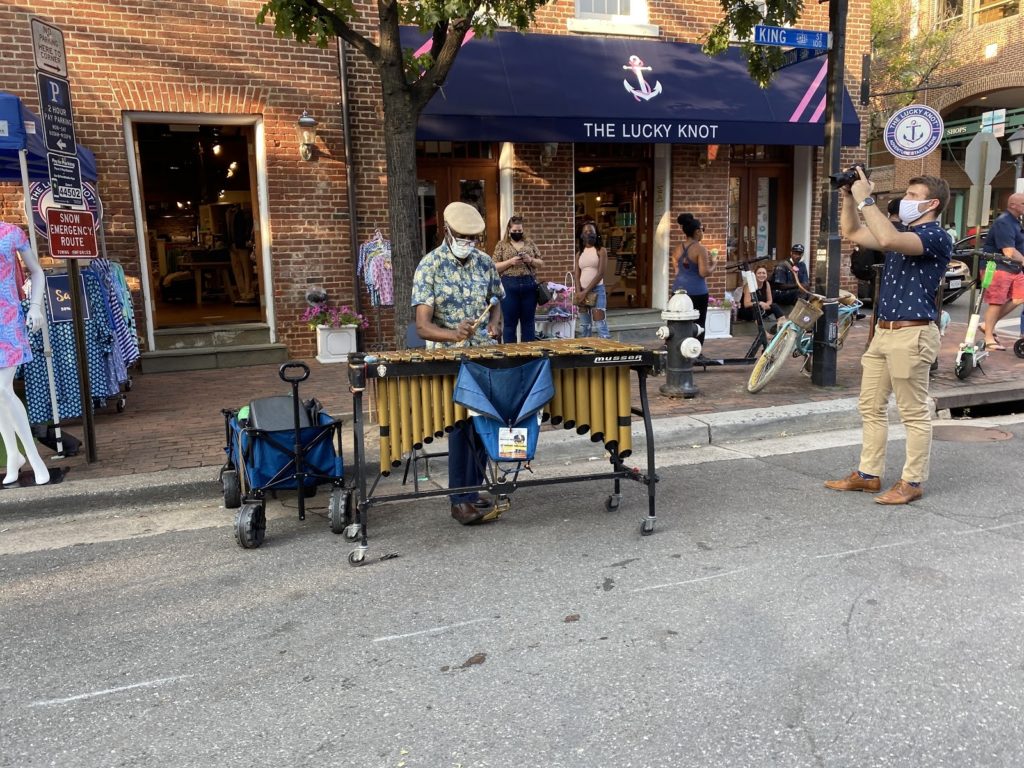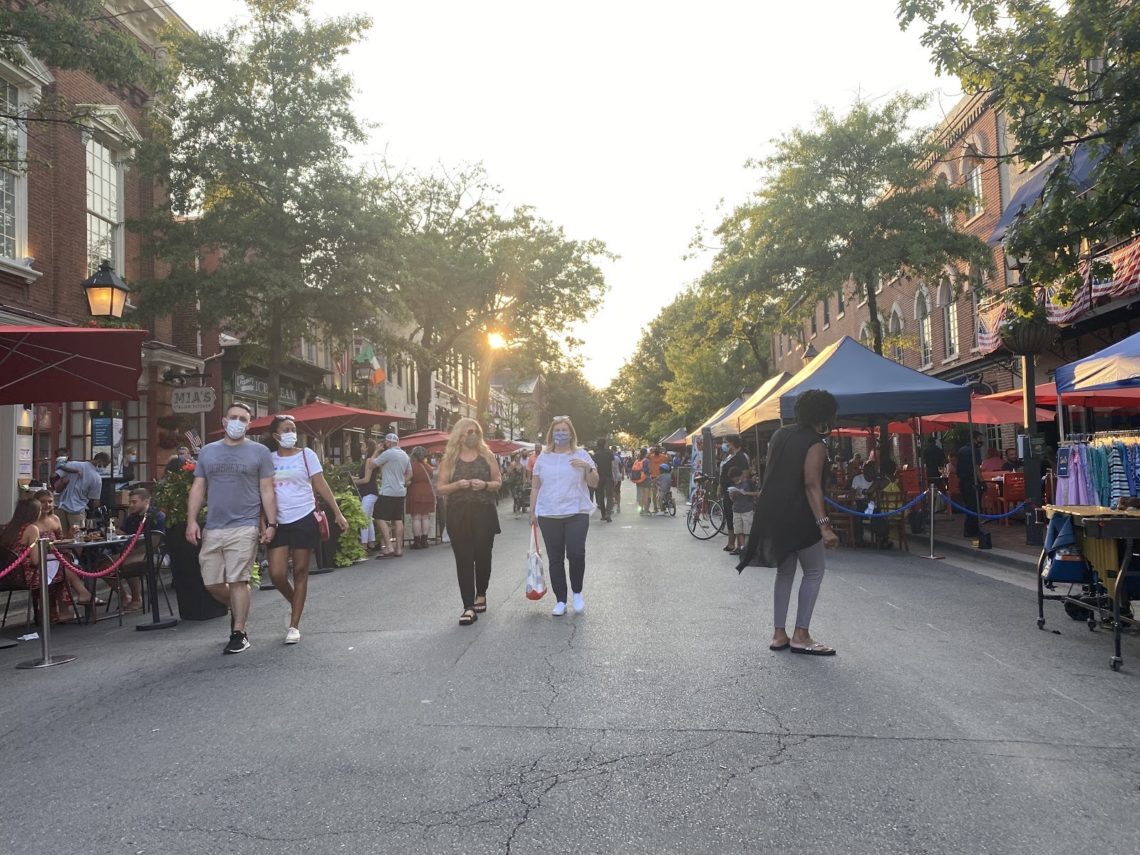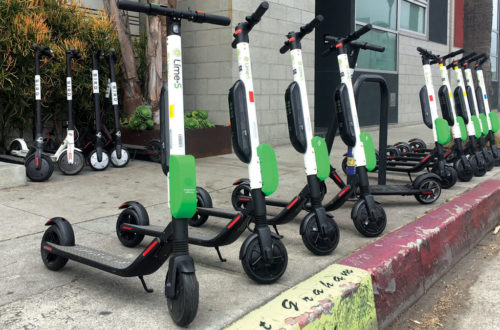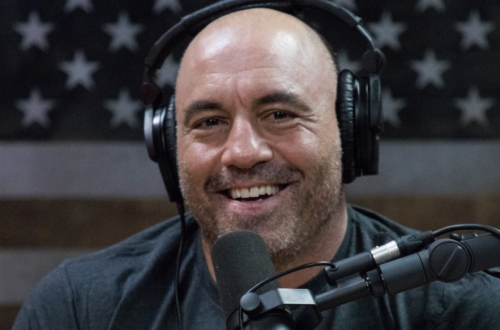What This Means For the Culture of “Liberal” Cities
Yahney-Marie Sangaré
Only three hours after the end of the Trump boat parade on the Potomac River, the colorful, historic streets of Old Town are already again packed with diverse, lively faces. Vendors sit in tents, their clothes, paintings, and prints advertised for sale telling multicultural narratives. The sun reflects off of the upstairs windows of the two-story brick buildings which adorn signs proclaiming “Black Lives Matter” and American flags from their windows. The majority of people are wearing masks, and with some exceptions, maintaining social distancing as much as feasible. A few eat at the recently opened outdoor seating areas of local restaurants, pulling their masks beneath their noses and chatting casually amongst themselves. There are only glints of remaining paraphernalia from the event- a boy passing by with a confederate flag bandanna wrapped tightly on his mouth and nose, a leather-clad, bearded man standing by his Harley Davidson, painted with stickers with such messages as “Don’t tread on me,” and “CoronaHoax.” A few paces away, a police officer smiles and greets the people walking by the stationery shop he guards, gun in holster. A single police car sits only a few paces away on King Street. Old Town is a few, almost invisible, steps away from normal.
On August 30, multiple boat owners (many belonging to the Old Dominion Boat Club), began a “Trumptilla” (the strange, socially distant rallies of this bizarre election year) from
Woodrow Wilson Bridge to Memorial Bridge. This event took place only one day after multiple boats sunk in Texas doing the same activity. A crowd gathered at Founders Park observing and cheering on the passing boats in a display for the Republican nominee for reelection in November. A few hours afterward, the chants of “Four more years!” have disappeared, as have most of the red Make America Great Again hats.
It’s no secret that Alexandria is known for its liberalism, as is most of Northern Virginia. Whereas Southern Virginian Republicans still hold the historical viewpoints of the Confederate state, the D.C. suburbs tend to overwhelmingly vote blue, with 76% of the city voting for Hillary Clinton over Donald Trump in 2016.

Many people, even Trump supporters, were shocked that a pro-Trump event could happen with a successful turnout in Alexandria. From the eyes of Alexandrian youth, especially, this event seemed almost infeasible and strangely underreported.
“I didn’t really think it would happen,” said Will Hamilton, a freshman at T.C. Williams High School, which is currently in the midst of a campaign for a name change due to controversy over former superintendent Thomas Chambliss Williams’ racist past, “I feel good, glad that [Alexandria] is not such a one-sided place.”
Some residents said that they felt “disgusted” and “revolted” at the presence of the parade in their city. Many did not know that the event happened at all, despite local news coverage. Although boat parades have been growing in popularity, it’s rare to see the boldness of peaceful protests and rallies that follow CDC guidelines and people’s First Amendment right to assemble.
“I’m not exactly surprised, more dumbfounded that people have the courage to [hold the boat parade] in the light of recent events,” said Cian P., a ninth-grader at T.C. Williams, “As long as they’re not hurting people or spouting hate speech, I think it’s alright. That doesn’t excuse the fact that they look extremely silly.”
Silly is the right word to describe the juxtaposition between the recent Black Lives Matter protests and the boat parades in Old Town near City Hall. It is strange at best, and undermining and offensive at worst.
“In all honesty, it feels very taboo and out of place in Alexandria,” said freshman Sasha Dafkova when asked if the rally fits the character of the city, “I absolutely do think that this rally sends a message. It shows that no matter how liberal or professional a place may seem, there will always be that one group of ignorant people who will try and destroy what the majority of that place is trying to accomplish.”
Dafkova’s words ring true when we begin to examine the impact of viewing towns as entirely liberal or conservative. This view is exaggerated with non-voters, especially; this year’s election will be the last in which the current attendees of T.C. Williams will mainly not be able to vote.
“Sure, this brings positivity for the campaign, but events like these don’t clearly demonstrate the big picture of how a lot of citizens—specifically working class—are still suffering because of the pandemic,” said an anonymous junior at T.C. Williams, “A lot of people won’t care about a bunch of boaters when they’re struggling to make rent, find a job.”
With Trump asserting that these parades are more of an indicator of current attitudes than the polls, people showing up to support the current president — whose comments have caused dissent and political tensions. The proximity to D.C.—also majority blue— further exaggerates the shock value of seeing Trump flags proudly flown in a liberal city.
In most Alexandria public schools, democratic political views are an unsurprising cultural norm. T.C. Williams High School has publicly expressed support for Black Lives Matter, and the vast majority of political discussion here is centered around social equality and equity.
“We’re basically surrounded by people with the same viewpoints as us,” said freshman Evelyn Milliken, who was in ACPS schools from 6-8th grade, “We don’t really see a lot of the other side.”
The gathering in Old Town, although certainly attended by residents across the DMV, highlighted the existence of these supporters locally. The people lined up for the parade were not wearing proud, red ball-caps; but in passing, their conversations expressing support for the president were indicative enough of the strange culture around being conservative in this town. Socially, it may be an unpopular opinion, but the impact on local politics and point of view is prominent.
“Now, as a senior in high school, I can clearly see that although optically we seem liberal and many of our voters are democratic, there is still a lot of discrimination and ignorance in Alexandria’s culture,” said Lucas T., who goes to T.C. Williams, further alluding to the recent movements for justice gaining momentum nationally and worldwide. It is difficult to miss the juxtaposition between participation at a Trump parade and a blue-voting city amid the wakeup call about racial justice finally being heard in mainstream environments.
It’s time for liberal cities to open our discussion about the fact that voting Democrat does not make us immune from the issues that are being talked about. With the president’s controversies, it’s important that genuine, open, honest conversations about the issues impacting our city transcend merely voting for Biden in the election.
There were multiple peaceful protests in Alexandria for the Black Lives Matter movement in June and July. After the murder of George Floyd, yard-signs started appearing touting their support for the movement in conjunction with social media becoming focused on spreading awareness on global conflicts and pressing issues, increasing the presence of informational Instagram posts. However, the separation between looking out and addressing what we see on the news nationwide and looking in at ourselves and our city is still perpetuating an insidious bias that breeds complacency and ignorance in our communities.
The Trump parade pulled open the blue curtains, revealing harsh realities that liberal cities often hide. We are just as much subject to the political debate, agenda, propaganda and ignorance as much as any other community is. Realizing this and taking action to rectify injustice begins with, before all else, the youth. Voices are finally being given to the next generation, and breaking down the barriers of blissful ignorance in our communities is crucial in ensuring a future of liberation, equity and education. The Trump parade by itself is not problematic; it is a legal gathering to rally support for a candidate. However, it does shed light on an often overlooked duality in liberal environments—one that cannot be ignored any longer.






